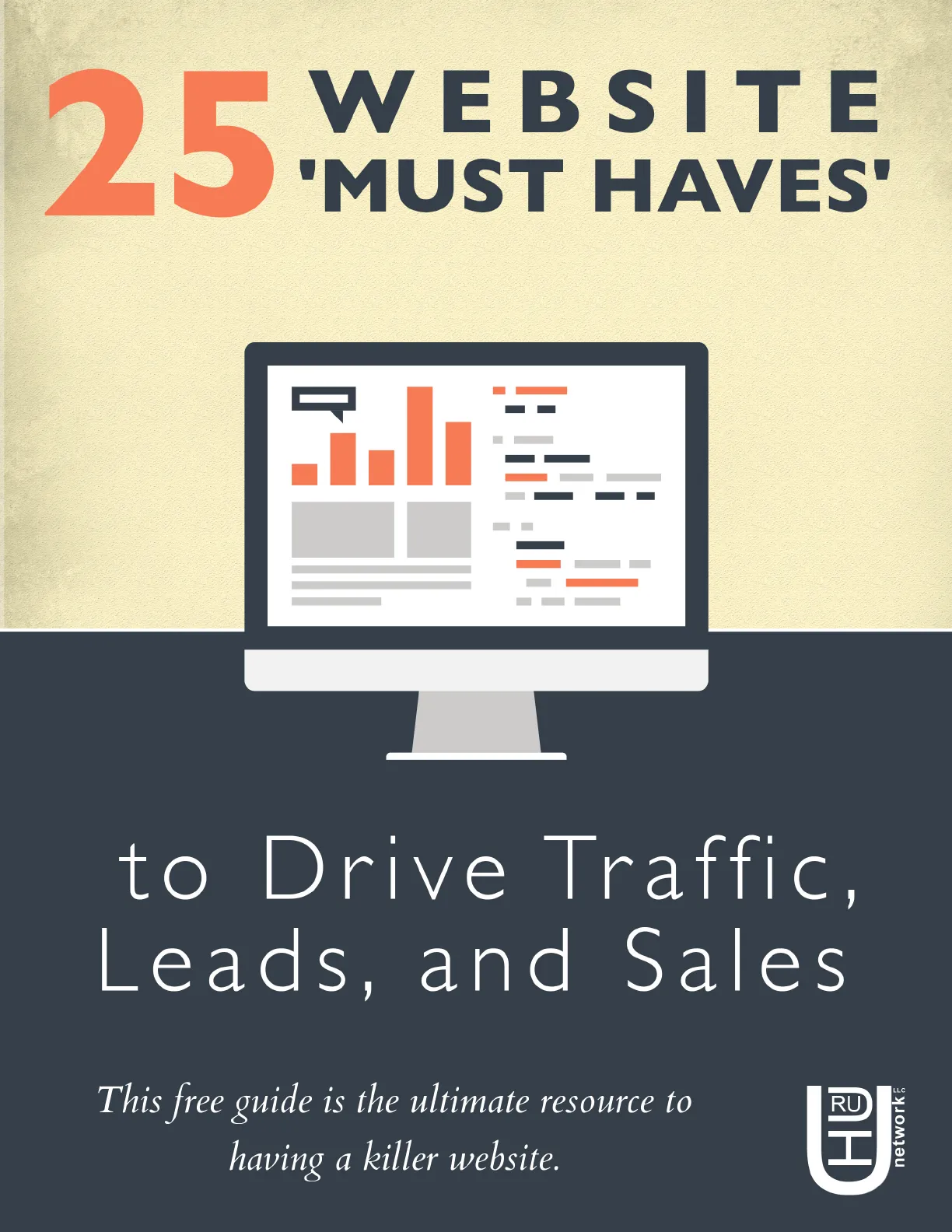25 Website Must Haves: A Presentation by Ruh Network
Slides from Ruh Network about 25 Website Must Haves. The Pdf offers practical advice on SEO, design, content creation, and conversion strategies for effective websites. This vocational education material in Computer Science is well-structured, providing a clean and professional layout for self-study.
Ver más53 páginas


Visualiza gratis el PDF completo
Regístrate para acceder al documento completo y transformarlo con la IA.
Vista previa
Introduction
We all know how important a website is to a business's online strategy. Almost every business, whether B2B, B2C, non- profit, local or global needs an online presence to reach buyers in the internet age. A company's website is its virtual storefront.
Shockingly, a recent survey by 1&1 Internet reported that up to 40% of small-to-medium sized businesses still don't have a website. Even if you're on social media, operating without a website is just silly. A website is an essential piece of your online marketing strategy.
Whether you're looking to build your first website, or if your existing site just isn't getting the traffic or leads you were hoping for, you may wonder what it really takes to have a great website.
A recent survey by 1&1 Internet reported that up to 40% of small-to- medium sized businesses still don't have a website.
Having a website alone isn't the key to great results. Instead, it's the ability turn your website into an inbound marketing machine. Your website has a hefty goal and it needs to wear many hats. A website needs to not just exist, it needs to perform. It needs to attract visitors, educate them and convince them to buy. But I know what you're thinking - easier said than done.UHURUNETWORK.COM // 4
Today, the web is social and interactive. It's not static like most websites tend to be. As such, a website can no longer sustain as its own island. We now need to consider integrating search, social media, content, blogging, and more with our websites. Gone are the days where all it took was a URL, fancy Flash graphics, and an expensive advertising campaign to temporarily boost traffic.
The reason for this shift is largely due to changing buyer behavior. Today's buyer wishes to consume information when they want and how they want and often-times without the involvement of a sales person. And more importantly, they want to be educated and not sold to. As you can see from the following chart, websites and new forms of inbound marketing content (such as podcasts, blogging and social media) have become a considerable factor in the buying cycle.
10 Years Ago Seller in Control
Today Buyer in Control
Fulfillment / Customer Service
Website
Outside Sales
Website
Shift to Self-Service
Inside Sales
Inside Sales
Fulfill- ment
Outside Sales
Brochures, Data Sheets, White Papers, Price Sheets, Testimonials
New Types of Content
Plus - Website Content, Podcasts, Screencasts, Blogs, Discussion GroupsUHURUNETWORK.COM //5
You'll also find in HubSpot's 2011 State of Inbound Marketing Report that inbound marketing is more effective in reaching today's buyer. Results show that inbound marketing has a 62% less cost per lead compared to outbound, or traditional, marketing.
What might not be apparently visible here is the role your website plays. It's actually a big one. In most cases, traffic from blogs, social media, organic and paid search end up converting into leads or sales on your main website. Without a website acting as an online basecamp, it would be difficult to attract new business to one source.
Below Average Cost per Lead, % Respondents by Lead Channel
60% Outbound
Majority reported blog leads are cheaper.
Inbound
% of Respondents
40%
55%
47%
20%
39%
36%
33%
27%
19%
0% Blogs Social Media SEO (Organic search)
Telemarketing Direct Mail
PPC (Paid search)
Trade Shows
HubSpot
This is why having an effective website is so crucial and that it contains key elements to driving more traffic, leads, and sales.
So without further ado, I present to you 25 Website 'Must Haves' for Driving Traffic, Leads and Sales. To learn more about a particular must-have, you'll find additional resources at the bottom of each topic. Definitely take advantage of these if you're looking to master inbound marketing.6
Get Found Online
A great website isn't so great if no one visits it. This is why the first chapter is dedicated to getting found online, which covers the very top of the funnel of your inbound marketing strategy. Search Engine Optimization (SEO) is an absolute must-have to any website strategy, but it takes hard work and consistency when aiming for the top spot. These tips will help get you on your way to increasing your organic (non-paid) search engine rankings.UHURUNETWORK.COM // 7
Building Inbound Links
Every website on the internet has the goal of reaching the #1 position in search engines but because there is only one top spot per keyword phrase, not everyone can make it. So what gets a first place ranking? Off-page search engine optimization (SEO) is the most important factor to increasing your ranking results.
Off-Page SEO is about building inbound links, essentially getting other quality websites to link back to you. Search engines call this authority or "link juice." The more inbound links you have, the more important your site must be, thus the higher you'll rank.
Ask You Tube
Broadcast Yourself
@ tripadvisor
----- if myspace.com
Your Website
€ TRAVELZOO
1 YAHOO!
flickr
KAYAK
Link building, when done right, isn't easy since adding links to other websites is sometimes out of your control. Here are some tips to building inbound links:UHURUNETWORK.COM //8
- Create high-quality, educational or entertaining content. If people like your content, they will naturally want to link to it.
- Submit your website to online directories. This is an easy way to start.
- Write guest posts for other blogs. This is a win-win for both parties. People will want extra (quality) content from others and in exchange, it's a great way to build inbound links.
- Researching link building opportunities with other websites, but always check the authority of the websites that you are trying to get links from. There are many tools online that allow you to check domain or page authority, including HubSpot's link grader tool.
- And don't borrow, beg, barter, bribe or buy links.UHURUNETWORK.COM //9
On-page Search Engine Optimization (SEO)
While off-page SEO is hugely important, we can't forget about on-page SEO. This consists of placing your most important keywords within the content elements of your actual pages. These on-page elements include Headlines, Sub-headlines, Body Content, Image Tags, and Links. Often times on-page SEO is referred to as "keyword density."
Keyword
It's very common that businesses will do too little on-page optimization or too much (keyword stuffing). While it's important to include your keyword as many times as necessary within a page, you don't want to go overboard with it either. For on-page SEO done right:
- Pick a primary keyword for each page and focus on optimizing that page for that word. If you oversaturate a page with too many keywords on one page, the page will lose its importance and authority because search engines won't have a clear idea of what the page is about. This is very common on homepages in particular, where too many keywords are used.UHURUNETWORK.COM // 10
- Place your primary keywords in your headline and sub-headline. These areas of content have greater weight to search engines.
- Include the keywords in the body content but don't use them out of context. Make sure they are relevant with the rest of your content.
- Include keywords in the file name of images (e.g. mykeyword.jpg) or use them in the ALT tag.
- Include the keywords in the page URL and keep the URL clean.
- And lastly, write for humans first, search engines second. Always prepare your content for your audience and then look to optimize it for search. Content written in the other order won't read naturally and your visitors will recognize it.
Headline
Free Ebook: The Essential Step-by-Step Guide to Internet Marketing
The Building Blocks for Succeeding With Marketing on the Web
Sub-headline
Whether you're just getting started with internet marketing or you just Bold text want to brush up on the basics, this ebook can serve as your essential guide to setting up and implementing a successful internet marketing strategy, step by step.
From establishing your initial keyword strategy to leveraging social media to promote content online all the way through to analyzing and refining your strategies, this comprehensive internet marketing ebook will guide you through every essential step you should be taking to effectively market your business on the web, whether you're a software company, a chimney sweep, a tailor, or a marketing agency, to name a few.UHURUNETWORK.COM //11
Title Tag & Meta Tags
While this may be the least sexiest component of SEO, it is a definite must-have. A Meta Tag is a line of code that is contained in the background of a web page. Search engines look at meta tags to learn more about what the page is about.
Meta tags don't quite have the level of SEO importance as they used to but are still very important. Back in the day, websites abused meta tags to increase their rankings by including far too many keywords. Now search engines are smarter and give more weight to inbound links and page content for ranking instead.
However, they still play an important role to an SEO strategy.
Make sure to use these on all of your pages.
<html> <head> <title>c <stv
If you're not a web guru, most website editors and content management systems enable you to easily edit meta tags without coding knowledge. If you don't have an editor, you can simply open a web page file (ending in .htm, .html, .asp or .php) in Notepad or a plain text editor and the meta tags will be found near the top of the document.